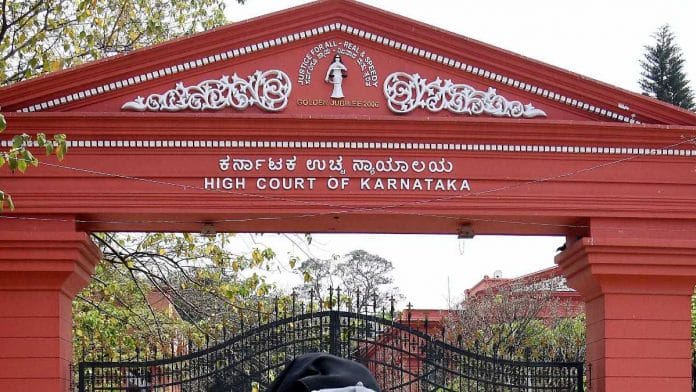New Delhi: Finding no evidence of any conversion or an attempt at it, the Karnataka High Court (HC), earlier this month, has quashed an FIR against three Muslim men accused of distributing pamphlets promoting Islam and allegedly making derogatory and critical remarks about Hinduism near a temple in Jamkhandi.
The Karnataka HC has held the allegations “insufficient to constitute an offence” under the Karnataka Protection of Right to Freedom of Religion Act (KPRFR Act). It has also noted that the complaint was made by a person who was not legally entitled to do so under the anti-conversion law.
None of the required elements for the offences claimed in the FIR—filed under Sections 299, 351(2), and 3(5) of the Bharatiya Nyaya Sanhita (BNS) and Section 5 of the KPRFR Act, 2022—have been found by the HC.
Section 3 of the KPRFR Act prohibits religious conversions through wrongful means, such as misrepresentation, coercion, or promise of marriage, with Section 5 prescribing punishment for its violations. Section 4 of the KPRFR Act limits who can file complaints under the Act—only the person allegedly converted or their close relatives.
Presiding over the hearing of a petition against the First Information Report on 17 July, Karnataka High Court Justice Venkatesh Naik T. quashed the FIR. He held that the complainant lacked locus standi, and the FIR did not disclose the essential ingredients of the alleged offences.
The Karnataka HC said: “Even if the allegations in the FIR are accepted, at its face value, it fails to satisfy the essential elements of an offence under Section 3 of the Act. There is no allegation that the petitioners converted or attempted to convert any person to another religion. The absence of these essential elements renders the allegations insufficient to constitute an offence under the Act.”
Also Read: Thug Life of Kamal Haasan: The case around his ‘Kannada-Tamil’ remark & Karnataka high court’s rap
Background of ‘conversion’ case
The FIR has said the complainant, who visited the Ramatheertham Temple in Jamkhandi on 4 May 2025 at 4.30 pm approximately, alleged that the three Muslim men were “distributing pamphlets promoting the teachings of Islam” and verbally explaining their religious beliefs near the temple.
According to the FIR, the devotees at the temple approached the group to enquire about their activities, after which the individuals allegedly began “criticising the Hindu religion” and making “derogatory remarks”. The FIR has quoted them as saying, “If you continue to stay as Hindu, you will not be able to find God. There is no God except Allah, and all other gods are Kafir”. Also, the group allegedly claimed their mission was to “make the whole world turn towards Islam” and threatened severe consequences for anyone obstructing its efforts, saying, “We will not spare your lives”.
The FIR has also alleged that the three Muslim men offered material benefits, such as vehicles and employment opportunities in Dubai, as inducements for converting to Islam.
Soon after, the accused filed a petition before the Karnataka HC, seeking the quashing of the FIR, contending that they were “merely preaching the teachings of Allah and Prophet Muhammad”. They asserted that in the absence of any specific allegation of any attempt to convert someone from one religion to another, the FIR did not meet the threshold to invoke the penal provisions of Section 5 of the KPRFR Act. They also argued that the complainant did not fall within the category of persons authorised to lodge a police complaint under Section 4 of the Act. Therefore, the FIR was legally unsustainable.
The prosecution, however, opposed the plea, contending that the FIR did disclose a cognisable offence under Section 5 of the Act.
In the context of the KPRFR Act, Section 4 specifically limits who can lodge a police complaint to the converted person or their close relatives. If someone outside this defined category lodges a complaint, he is said to lack locus standi. In essence, such individuals lack legal standing to initiate the case.
Locus standi refers to a person’s legal right or capacity to bring an action before or be heard in a court of law, depending on whether the person has sufficient and direct interest in the case. In other words, only individuals directly affected by an issue can initiate legal proceedings, or anyone legally authorised can.
Court findings in ‘conversion’ case
In its judgment, the Karnataka HC observed that Section 3 of the KPRFR Act prohibits religious conversion through misrepresentation, force, fraud, undue influence, coercion, allurement, or promise of marriage, Section 4 limits the locus of the complainant to a defined set of individuals, and Section 5 penalises violations of Section 3.
The HC held: “In the present case, the complaint was lodged by a third party, who does not fall within the category of persons enumerated under Section 4 of the Act. Therefore, registration of FIR by the 2nd respondent, who lacks locus standi, is legally invalid.”
Besides, there was no accusation that the accused petitioners had converted or attempted to convert any individual from one religion to another, the Karnataka HC added.
“The absence of these essential elements renders the allegations insufficient to constitute an offence under the Act. Consequently, the registration of the FIR, culminating in the filing of the charge sheet, is vitiated,” the HC stated.
Allowing the petition, the Karnataka HC quashed the FIR and all proceedings emanating from it.
(Edited by Madhurita Goswami)






